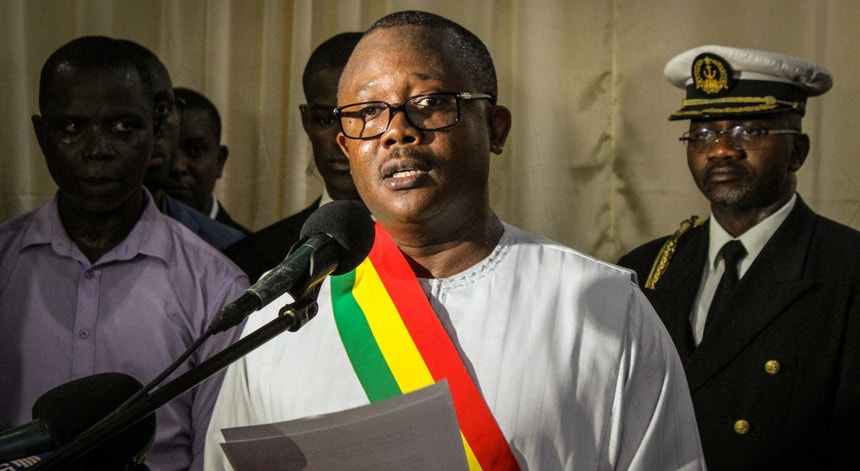Public radio and television broadcasts have been suspended after military intervention, who removed the employees present in the buildings.The Portuguese embassy advised its citizens to restrict travel in the capital until the political situation is clarified.
The institutional turmoil started Thursday night, with the symbolic nomination of Embaló as President, at a ceremony held in a hotel in the Guinean capital in the absence of the Government, parliamentary majority parties and the country’s main international partners.
The government described it as a “coup d’etat”.
Embaló was nominated by Nuno Nabian as the leader of the United People’s Assembly – Democratic Party of Guinea-Bissau (APU-PDGB), which was part of the Government coalition, but which supported Sissoco Embaló in the second round of the presidential elections.
Nabian is also the first vice-president of the National People’s Assembly and it was in this capacity that he symbolically nominated Sissoco Embaló.
The ceremony ended with the signing of the term of power between the outgoing President, José Mário Vaz, and Umaro Sissoco Embaló.
“Appeal to the uprising”
The Government of Guinea-Bissau considered the act as a “coup d’etat” and “an attitude of war” and accused the outgoing President of self-depriving himself and the Armed Forces of “complicity”.
Prime Minister Aristides Gomes summoned the diplomatic corps present in the country and advised him not to attend the inauguration.
At the beginning of this Friday night, the confusion worsened, when Sissoco Embaló dismissed the Prime Minister, Aristides Gomes and appointed Nuno Nabian to replace him, in a presidential decree released to the press.
Embaló’s text stated that the resignation was justified by the “serious and inappropriate action” of the prime minister, when he summoned the diplomatic corps and called for war and upheaval, in the event of the investiture of the new head of state.
The document also explained that the prime minister’s resignation took into account the “artificial post-election crisis created by the PAIGC (African Party for the Independence of Guinea and Cape Verde) party and its candidate for the presidential elections, which calls into question the normal functioning of the institutions of the Republic “.
A crisis situation, adds the decree, “embodied in public declarations of contempt and lack of recognition of the legitimacy and authority” of the democratically elected head of state, by free, universal, secret suffrage, considered by the free, fair and transparent and confirmed four times by the National Elections Commission “.
For Aristides Gomes, the decree of his resignation constitutes himself a “coup d’etat”.
Another President
Parliament has meanwhile appointed Cipriano Cassamá, president of the National People’s Assembly of Guinea-Bissau, as interim President, in a session attended by 52 deputies.
The inauguration was conferred by Mrs Dan Ialá, first secretary of Parliament’s table, invoking paragraph 2 of article 71 of the Guinean Constitution, which provides that, if there is vacancy in the head of the State, the position is held by the President of the National People’s Assembly, the second figure of the State.
For the deputies, the situation is verified since, having left the outgoing President, José Mário Vaz, the position was vacant, since they do not recognize Sissoco Embaló as the new President.
Armando Mango, Minister of the Presidency of the Council of Ministers and Parliamentary Affairs of the Government of Aristides Gomes, has since assumed the post of first vice-president of the parliament of Guinea-Bissau, before the leader of parliament was appointed interim President of the Republic.
“Since I am a deputy and having resigned as minister of the Presidency of the Council of Ministers, I resume the position of deputy and the deputies appointed me first vice-president of the assembly“, said Armando Mango, elected deputy by the United People’s Assembly – Democratic Party of Guinea-Bissau (APU-PDGB).
Armando Mango will temporarily assume the presidency of Parliament.
–
Simões Pereira outraged
The PAIGC candidate for Guinea-Bissau’s presidential election, Domingos Simões Pereira, considered today that the situation that the country is going through “does not dignify the democratic process” and that the Guinean people no longer deserved this political crisis.
Speaking to the Lusa agency by telephone, the candidate and leader of the African Party for the Independence of Guinea and Cape Verde (PAIGC) reacted to the most recent political crisis in Guinea-Bissau, with the symbolic takeover of his opponent in the elections, Umaro Sissoco Embaló, as President on Thursday and who today has already dismissed the Prime Minister.
“I regret everything that is happening and hope that we will be able to find the solutions that are needed” because the current situation “does not dignify the democratic process” in Guinea-Bissau, he said.
–
Santos Silva does not clarify
The Minister of Foreign Affairs of Portugal appealed to all Portuguese residents in Guinea-Bissau to restrict “circulation to what is strictly necessary”, after military movements following the installed political instability.
 –
–
The head of Portuguese diplomacy reiterated the need to avoid “any confrontation and any acts of violence” in Guinea-Bissau.
The official added that “all interested parties” should guide “their behavior by respecting the law and the principle of peaceful behavior” to resolve “disputes and conflicts”.
Asked also whether Portugal recognizes Umaro Sissoco Embaló as President of the Guinean Republic, Santos Silva said that he still did not want to comment “on this point”.
According to data from the Portuguese Government, around 2,500 Portuguese live in Guinea-Bissau.
The position of the head of Portugal’s diplomacy is in line with the appeal made by the Portuguese embassy in Bissau, which today advised the Portuguese living in Guinea-Bissau to restrict circulation due to “an eventual increase in tension, with possible reflexes at the level of security “.
In the message, the embassy adds that “will continue to monitor the situation”, referring that in case of urgency, the Portuguese may contact the Consular Emergency Office through the numbers 961 706 472 and 217 929 714 and the e-mail addresses [email protected] and [email protected].
–
With Lusa
– .


